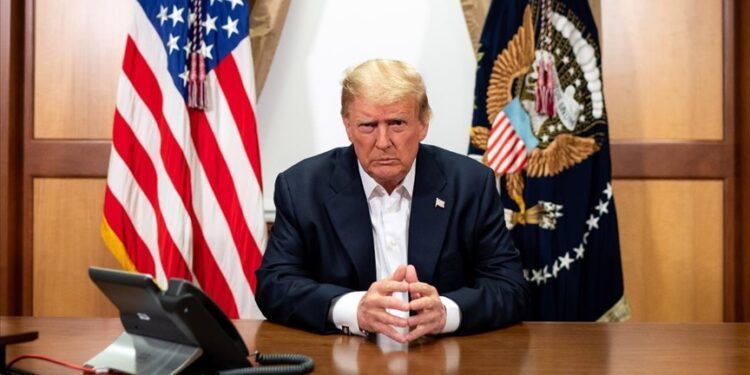By Thomas Greminger
– To address Russia’s demand that Ukraine remain outside NATO, a long-term moratorium on Ukraine’s membership – conditional on Russia’s adherence to peaceful behavior – could be a compromise that alleviates Moscow’s concerns without undermining NATO’s open-door policy
– The author is Executive Director of the Geneva Center for Security Policy (GCSP) and former Secretary General of the Organization for Security and Cooperation in Europe (OSCE).
ISTANBUL
Are US President Donald Trump’s actions igniting the end of transatlantic relations? The short answer is no: They have been built up over decades and are too strong to be fundamentally questioned by one US president. However, there is no doubt that these relations are currently undergoing a serious test. There is a particular challenge to European partners who have to step up their contribution to counter military threats on the eastern flank. However, the current US pressure also presents an opportunity to advance greater European security autonomy.
Trump and his close aides have chosen to adopt an approach that is different to the classical methods of international diplomacy. Trump’s approach is based on disruption. Demands are not made palatable to partners by arguments but by building up a threat posture. Then the White House would wait for a reaction and decide to either maintain the threatening stance or to negotiate.
The key is to remain calm, avoid overreacting, and carefully evaluate policy responses to the new administration’s actions. That said, I would advise European partners to urgently invest in two types of reflections: first, how to strengthen the European contribution to maintaining European security and second, to develop common European positions to ceasefire and settlement negotiations that could be launched in a not-too-distant future. Work on the former has already advanced more than on the latter.
It is undisputed today that Europeans need to increase their defense efforts. It is likely that the US will gradually shift its hard security posture in Europe to what experts call “offshore balancing.” This would imply maintaining the American nuclear umbrella but pulling troops and weaponry out of Europe. It would oblige Europeans to address strategic capability gaps and to massively strengthen defense cooperation. Increasing defense spending to 5% of GDP, as requested by Secretary of Defense Hegseth, would not be necessary. More important is to change the mindset in the development, production and procurement of weapon systems and the structuring of armed forces. The continent needs to move from a still predominantly national to a European logic. Institutionally, this would require building up a strong European pillar of NATO, strengthening defense cooperation with the EU and finding creative ways to integrate non-members into joint defense cooperation endeavors.
We may see different negotiation formats when the different collisions – Russia vs. Ukraine, Russia vs. Europe and Russia vs. the US – are addressed. Europeans obviously belong at the negotiation table when the future of European security is decided. However, doing this effectively requires developing common positions on issues that go beyond sustaining strong political, military, and financial support to Ukraine. It begins with agreeing that Europe’s objectives in the war should focus on defending Ukraine’s sovereignty and territorial integrity, rather than strategically weakening Russia. It continues with a mutual understanding of how a technically sound ceasefire would look like and who would contribute to monitoring and verifying it.
A fundamental aspect of the sustainability of any agreement is the security guarantees for both warring parties. Since NATO membership for Ukraine does not seem to be in the cards, convincing alternatives need to be found. Further solidifying the more than 20 bilateral security arrangements that have been concluded since the NATO Vilnius Summit in 2023 appears to be a realistic way forward. To address Russia’s demand that Ukraine remain outside NATO, a long-term moratorium on Ukraine’s membership – conditional on Russia’s adherence to peaceful behavior – could be a compromise that alleviates Moscow’s concerns without undermining NATO’s open-door policy.
The contentious territorial issues could be overcome by agreeing to a temporary cessation of control without conceding on the principle of territorial integrity. There are further controversial issues that need to be dealt with in a settlement process that could build on an agreed ceasefire. Gradual sanction relief, reparations and war crime accountability are the most prominent among them. The sooner Europeans develop common positions on these matters, the more forcefully they will be able to defend their interests in negotiations.
Europe will also have to develop common thinking on the future of the European security order. It is fair to assume that the short to medium term will be dominated by deterrence, i.e., by an order that is built to defend Europe against further Russian aggressions. However, from a long-term perspective we have to strive for a European security order that allows to integrate the largest country on the European continent again, should Russia choose to adopt its behavior accordingly. This requires policies that combine deterrence with dialogue and detente as NATO’s Harmel Doctrine in 1967 asked for and later allowed the Helsinki Process to start. In a post-war setting, the OSCE, whose secretariat is led by top Turkish diplomat Feridun Sinirlioglu, could offer an ideal platform for an inclusive reflection on how to reconstruct a European security order that would again embrace elements of cooperative security.
*Opinions expressed in this article are the author’s own and do not necessarily reflect DIPLOMATICINFO.COM’s editorial policy.






